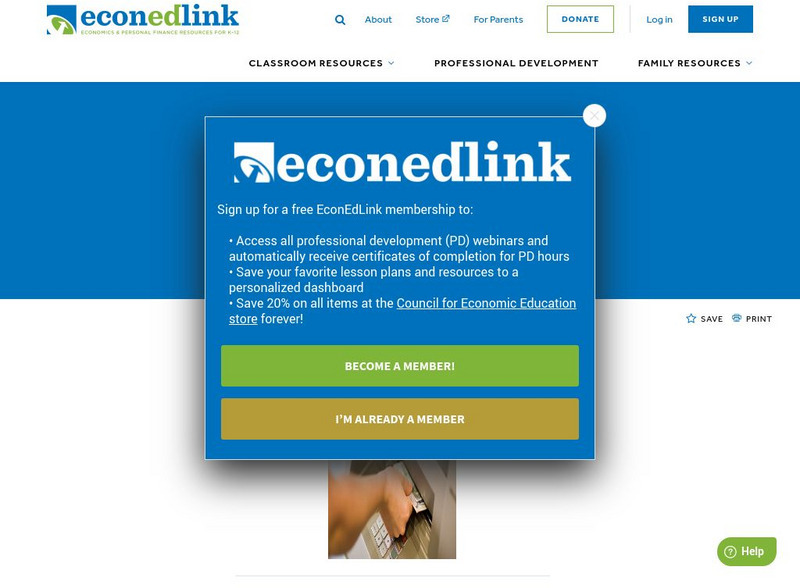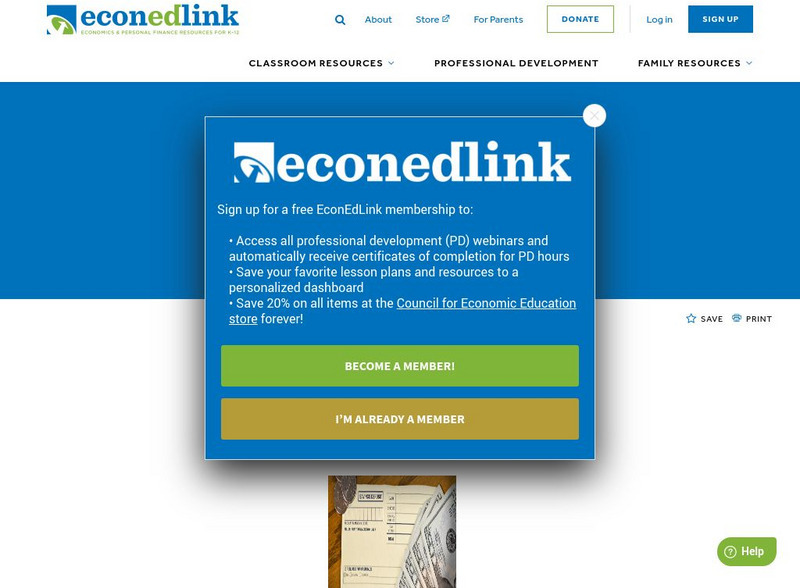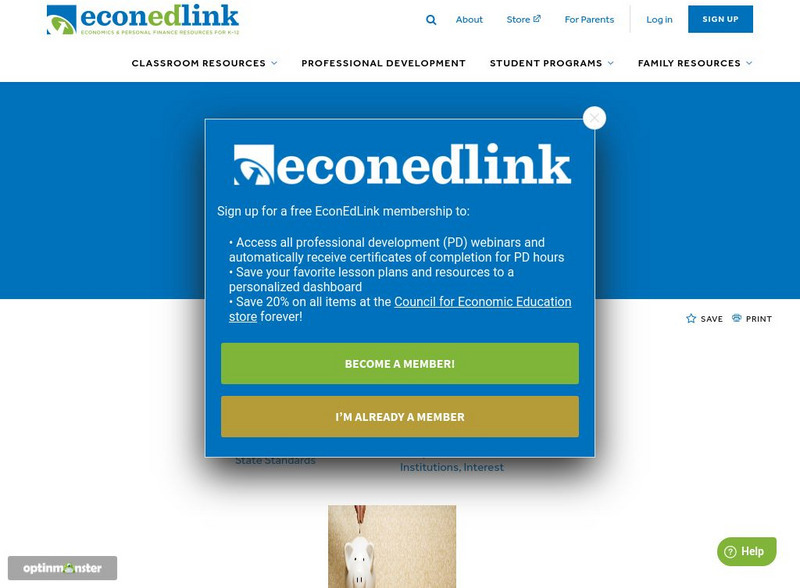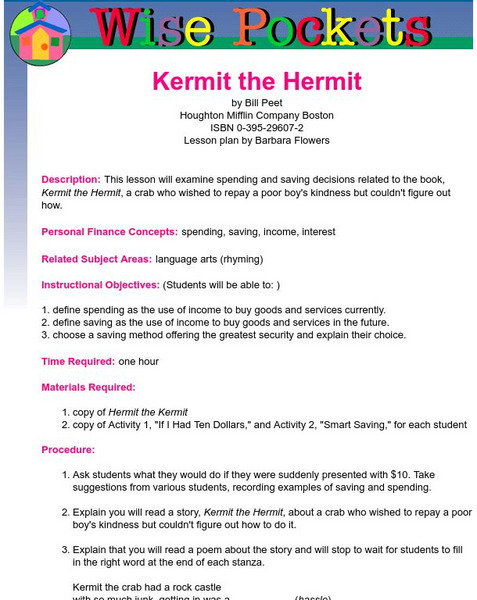Other
Federal Reserve Bank of New York: Econ Explorers Journal [Pdf]
In this collection of lesson activities, students will complete an "Econ Explorers Journal" to help them learn how economics is involved in their neighborhood, the books they read, in earning a living, at their banks, in their homes, and...
Council for Economic Education
Econ Ed Link: The Story of Jack and the Bank Stalk
Fairy tales have always been used to give lessons about life. The story of Jack and the Bean Stalk is a good instructional activity about the importance of knowing about money and banks. The story of Jack asks the question, "What is money?"
Council for Economic Education
Econ Ed Link: You Can Bank on This! (Part 1)
This is the first of four lessons on banking for elementary students. This lesson provides the students with information on banking; it also allows them to try out some procedures for thinking about money and banking. There is a link to...
Council for Economic Education
Econ Ed Link: Banks, Bankers, Banking
This lesson is a simulation of opening a bank. Students are assigned various roles to play within the banking business. Students learn about the role banks play in a market economy.
University of Nebraska Omaha
Ec Ed Web: Virtual Economics Web Companion
The Virtual Economics Web Companion for K-12 economics and social studies teachers was created by the National Council on Economic Education. A wide variety of educational materials and lesson plans can be accessed through this site....
Federal Reserve Bank
Federal Reserve Bank of Philadelphia: Monetary Policy [Pdf]
Understand how the Federal Reserve establishes monetary policy through the activities provided in this lesson plan unit. The guide is intended to accompany the bank's "Money in Motion" exhibit, which can be explored through a virtual...
Council for Economic Education
Econ Ed Link: Big Banks, Piggy Banks
Use this informative economics lesson plan. Find out how to save your money. "You will read about safe places for keeping money; you also will learn about places where money can earn money."
Khan Academy
Khan Academy: Lesson Summary: Banking and the Expansion of the Money Supply
This lesson summary from Khan Academy is intended for students who are taking the AP Macroeconomics course. In this lesson summary will review key terms and calculations related to fractional reserve banking, required reserves, excess...
Council for Economic Education
Econ Ed Link: Big Banks, Piggy Banks
When choosing a place to put their money, people consider how safe there money will be, how easy it is to access, and whether it will earn more money. Students explore how well different savings places achieve these objectives. This...
Council for Economic Education
Econ Ed Link: Multipliers and the Mystery of the Magic Money
Students learn about the purpose of the reserve requirement, how money is "created" in the economy through fractional reserves, and how the Federal Reserve uses the reserve requirement and loans to correct economic instability.
Council for Economic Education
Econ Ed Link: Banks & Credit Unions (Part I)
Students learn about banks and credit unions, identifying similarities and differences between the two types of financial institution. They also evaluate a local bank and credit union to determine which one would be better suited to...
Council for Economic Education
Econ Ed Link: Banking Is Interest Ing!
Banks are important to Americans. We use banks to save money and earn interest, or borrow money and pay interest. This lesson introduces the concepts of banking to children.
Council for Economic Education
Econ Ed Link: Agent Pincher: P Is for Penny or Where Did Money Come From?
What if we woke up tomorrow and found that there were no more pennies? Or what if we found that money had disappeared altogether -- not only from our pockets but from banks, stores and all the other places where we would expect to find...
Council for Economic Education
Econ Ed Link: Focus on Economic Data
This lesson focuses on the May 1, 2013, press release by the Federal Reserve System's Federal Open Market Committee (FOMC) on the current Federal Reserve monetary policy actions and goals, and specifically, the federal fund's rate...
Council for Economic Education
Econ Ed Link: This Little Piggybank Went to Market
A good lesson that conveys to young students why people work and why they keep their money in banks.
Council for Economic Education
Econ Ed Link: Buy a Bond, James: A Lesson on Us Savings Bonds
This site is extremely informative for teaching children the value of saving money. "You will write a persuasive letter telling why people use savings bonds as a way to save their money."
Council for Economic Education
Econ Ed Link: It's a Not So Wonderful Life
In this lesson young scholars learn about banks and banking. The study the fractional reserve system, and the role the Fed plays in the money creation process.
Council for Economic Education
Econ Ed Link: Climbing the Savings Mountain
Students discover how saving money can be compared to a mountain climb. The climb can be fast or slow, safe or hazardous, scenic or thrilling. You will find out that there is more than one way to get to the top!
University of Missouri
University of Missouri: Wise Pockets: Berenstain Bears' Trouble With Money
Using a Berenstain Bears' book, students are introduced to concepts such as spending, goods, services, income, saving, and interest. Lesson is detailed and has good activities. Includes questions about the story that teach students about...
Council for Economic Education
Econ Ed Link: The Road to Emerald City Is Paved With Good Intentions
'The Wizard of Oz' is perhaps the most popular film ever made. Generations of families have enjoyed this classic tale of Dorothy's struggle to return home from a faraway land. What is not well known, however, is that 'The Wonderful...
University of Missouri
University of Missouri St. Louis:wise Pockets: Kermit the Hermit
This is an elementary level lesson that deals with spending, saving, income, and interest. Requires the book Kermit the Hermit by Bill Peet. Includes detailed lesson plan along with procedures and activities.
Council for Economic Education
Econ Ed Link: Clickety Clack, Let's Keep Track!
This lesson plan will show students the importance of keeping track of their savings.
Council for Economic Education
Econ Ed Link: Giving Credit
This life lesson will prepare learners for the world of credit. "In this lesson, you will analyze the creditworthiness of people who want to borrow. You will also learn how to identify ways to establish your creditworthiness."
Council for Economic Education
Econ Ed Link: Should I Use Cash or Credit?
This is a lesson presented by EconEdLink that delivers the dilemma of cash or credit. Includes background information, a problem-solving grid, and great questions.
![Federal Reserve Bank of New York: Econ Explorers Journal [Pdf] Lesson Plan Federal Reserve Bank of New York: Econ Explorers Journal [Pdf] Lesson Plan](https://d15y2dacu3jp90.cloudfront.net/images/attachment_defaults/resource/large/FPO-knovation.png)



![Federal Reserve Bank of Philadelphia: Monetary Policy [Pdf] Lesson Plan Federal Reserve Bank of Philadelphia: Monetary Policy [Pdf] Lesson Plan](http://content.lessonplanet.com/resources/thumbnails/409971/large/bwluav9tywdpy2symdiwmduymc0xmdi1ns01mhfzcwsuanbn.jpg?1589982796)








